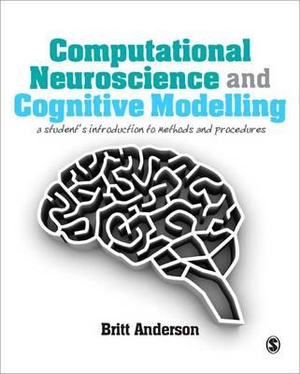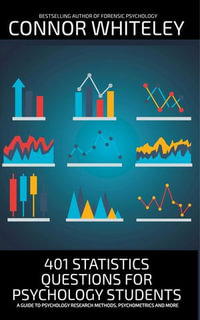
eTEXT
Computational Neuroscience and Cognitive Modelling
A Student's Introduction to Methods and Procedures
By: Britt Anderson
eText | 8 January 2014 | Edition Number 1
At a Glance
eText
$115.49
Instant online reading in your Booktopia eTextbook Library *
Read online on
Not downloadable to your eReader or an app
Why choose an eTextbook?
Instant Access *
Purchase and read your book immediately
Read Aloud
Listen and follow along as Bookshelf reads to you
Study Tools
Built-in study tools like highlights and more
* eTextbooks are not downloadable to your eReader or an app and can be accessed via web browsers only. You must be connected to the internet and have no technical issues with your device or browser that could prevent the eTextbook from operating.
"For the neuroscientist or psychologist who cringes at the sight of mathematical formulae and whose eyes glaze over at terms like differential equations, linear algebra, vectors, matrices, Bayes’ rule, and Boolean logic, this book just might be the therapy needed."
- Anjan Chatterjee, Professor of Neurology, University of Pennsylvania"Anderson provides a gentle introduction to computational aspects of psychological science, managing to respect the reader’s intelligence while also being completely unintimidating. Using carefully-selected computational demonstrations, he guides students through a wide array of important approaches and tools, with little in the way of prerequisites...I recommend it with enthusiasm."
- Asohan Amarasingham, The City University of New York
This unique, self-contained and accessible textbook provides an introduction to computational modelling neuroscience accessible to readers with little or no background in computing or mathematics. Organized into thematic sections, the book spans from modelling integrate and firing neurons to playing the game Rock, Paper, Scissors in ACT-R. This non-technical guide shows how basic knowledge and modern computers can be combined for interesting simulations, progressing from early exercises utilizing spreadsheets, to simple programs in Python. Key Features include:
- Interleaved chapters that show how traditional computing constructs are simply disguised versions of the spread sheet methods.
- Mathematical facts and notation needed to understand the modelling methods are presented at their most basic and are interleaved with biographical and historical notes for contex.
- Numerous worked examples to demonstrate the themes and procedures of cognitive modelling.
An excellent text for postgraduate students taking courses in research methods, computational neuroscience, computational modelling, cognitive science and neuroscience. It will be especially valuable to psychology students.
Industry Reviews
The neural and cognitive sciences are increasingly quantitative and computational subjects, and curriculums are now attempting to reflect this emerging reality. Accordingly, an important educational challenge is to inform undergraduate students of the significance of computational thinking, while also preparing them to appreciate and criticize it. An Invitation to Computational Neuroscience and Cognitive Modeling achieves this difficult goal wonderfully. Anderson provides a gentle introduction to computational aspects of psychological science, managing to respect the reader’s intelligence while also being completely unintimidating. Using carefully-selected computational demonstrations, he guides students through a wide array of important approaches and tools, with little in the way of prerequisites. As well as a very practical introduction to computer programming, there is impressive coverage of dynamical systems models of neurons, neural network models of memory, probabilistic models of decision-making, and mathematical models of thought. I recommend it with enthusiasm.
Read online on
ISBN: 9781446297360
ISBN-10: 1446297365
Published: 8th January 2014
Format: ePUB
Language: English
Audience: College, Tertiary and University
Publisher: SAGE Publications, Ltd. (UK)
Edition Number: 1
You Can Find This eBook In
This product is categorised by
- Non-FictionPsychologyCognition & Cognitive Psychology
- Non-FictionPsychologyPsychological MethodologyPsychological Testing & Measurement
- Non-FictionPsychologyPhysiological & Neuro-Psychology, Biopsychology
- Non-FictionReference, Information & Interdisciplinary SubjectsResearch & InformationResearch Methods
























